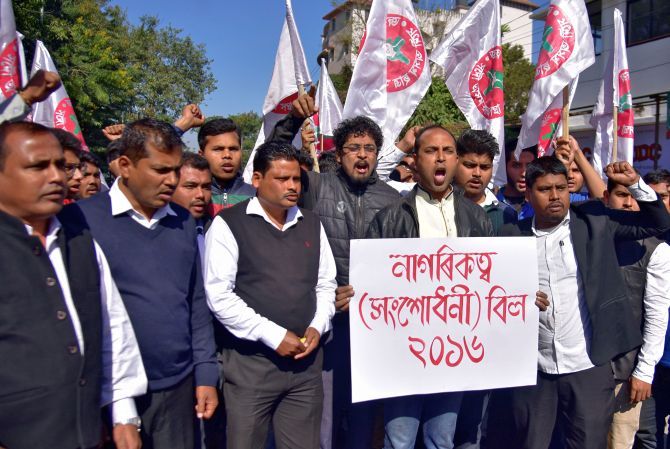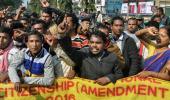The Asom Gana Parishad's fears relating to the Citizenship Bill are not misplaced. But does the AGP still matter in Assam's politics, asks Aditi Phadnis.

Let us be clear. The Asom Gana Parishad, which recently walked out of the National Democratic Alliance, snapped its ties with the Bharatiya Janata Party and got its ministers to step down from the state government, knows it is peripheral to the stability of the Sarbananda Sonowal government in Assam.
The BJP and AGP formed an alliance before the 2016 state election, in which the BJP won 61 of the 126 assembly seats and the AGP got 14.
Along with the Bodoland People's Front's 12, the BJP-led alliance's tally went up to 87, well above the half-way mark. The AGP's exit will make no difference to the ruling alliance's majority.
But paradoxically, the exit represents the AGP's fight for political relevance, even survival.
Prafulla Kumar Mahanta, who led the AGP at the height of the Assam movement and became India's youngest chief minister at 33, is now in his late 60s. The party he once led is now a shadow of its former self and is headed by Atul Bora who heads a faction that is opposed to Mahanta.
Many argue that the AGP's political eclipse is self-inflicted.
The BJP and AGP contested the 2001 assembly elections in an alliance. But for the 2006 assembly elections, the AGP allied with the Left parties instead. It returned to the BJP-led NDA for the 2009 Lok Sabha election only to leave it before the assembly elections two years later.
Every alliance with the BJP cost the AGP its base and vote share.
And the alliance in 2016 was especially disastrous because the BJP grew so much at the cost of the AGP that it was able to form a government for the first time in the history of the state.
Of all the strands that came together to cause the people's upsurge in Assam in the 1970s and 1980s resulting in the AGP's birth, one has remained: The problem of Bangladesh.
The others -- neocolonialism by the Centre, exploitation of Assam's natural resources without giving it anything in return etc -- have faded into the background. But the problem of who an Assamese is, continues to be the primary political issue even after all these years.
Assam still feels hunted and threatened by 'outsiders': Bengali Muslims, Bengali Hindus, Marwaris and north Indians, Bihari labour etc. But now, another category has been added to this list by the Citizenship Amendment Bill 2016, passed earlier this month by the Lok Sabha.
This allows Bangladeshi Hindus to come to India, get citizenship and settle, to avoid religious persecution. As Bangladesh is just a few kilometres away from Assam, guess where they will all land?
The AGP doesn't want 'any' outsiders to come and settle in Assam. Not Hindus, not Muslims, not tribals, not anyone.
It wants no threats to Assam's traditions and culture. It left the NDA on this issue. It claims it had a pre-poll alliance with the BJP so the BJP was fully aware of the AGP's objections to legislation such as this.
But the fact that the BJP went ahead and passed the Bill means it thought nothing of trampling on the feelings of an alliance partner.
For the BJP, the compulsions are different. In a perfect world it would have wanted to hang on to the AGP: but its sights are set on neighbouring West Bengal.
It wants -- if not to wrest the state from Mamata Banerjee -- to make significant dents in Banerjee's vote base by hammering home the point that Bengali (and Bangladeshi) Muslims have become a favoured community under her regime, offering the Hindus of the state a grievance and an identity.
It reckons that with the Citizenship Amendment Bill, it can kill two birds with one stone: Consolidate its base in Assam's Brahmaputra valley and create a profile for itself in West Bengal.
While it is not hard to understand the party's compulsions, the Citizenship Amendment Bill has only added to fears, insecurities and anxiety of Assam even as the National Register of Citizens rolls on completing its work of enrolling bona fide Indians as citizens and striking off the names of others from voters lists.
On top of all this trauma is added another layer of worry -- that hundreds of thousands of Hindus from Bangladesh will come trooping into Assam once the Citizenship Amendment Bill becomes an Act. How will they be fed? Housed? Educated? Whose land will they till?
These are the fears the AGP wants to articulate and harness politically. It believes the first step is walking out of the NDA. But is that enough?
As perspicacious Assam watcher Saubhadra Chatterji of the Hindustan Times observed: 'The AGP continues to have its office in Ambari, in the heart of Guwahati. But does it still have a place in the hearts of the Assamese?'












 © 2025
© 2025